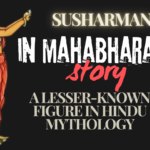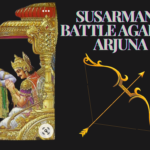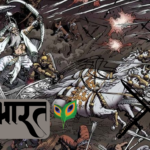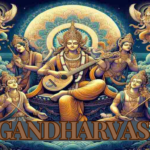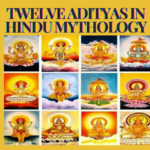The tale of Bhishma is one of the most compelling narratives in the Mahabharata, filled with divine interventions, noble sacrifices, and exemplary valor. Bhishma, originally named Devavrata, was the eighth son of King Shantanu and the Goddess Ganga. His life story is a testament to duty, loyalty, and the complexities of royal promises.
The Mysterious Phenomenon on the Ganga.
One day, King Shantanu noticed an unusual phenomenon: the Ganga river had become shallow at a certain spot. Puzzled by this strange occurrence, he investigated further and discovered a handsome young lad of sixteen, shooting arrows into the water and creating a barricade across the mighty river. Amazed by the youth’s ability to single-handedly dam the river, Shantanu watched in awe.
At that moment, Goddess Ganga appeared and addressed Shantanu. She revealed that the young boy was their eighth son, whom she had raised with great care. “He has studied the entire Vedas and Vedangas under Sage Vasishta,” Ganga said. “He is also a mighty bowman, equal to Indra himself in battle, and is well-versed in the duties of kingship.” With these words, Ganga handed the boy over to Shantanu and disappeared.
The Birth and Training of Devavrata.
Devavrata, later known as Bhishma, was brought up with immense love and rigorous training. Under the tutelage of Sage Vasishta, he mastered the Vedas, Vedangas, and the art of warfare. His skills and wisdom soon made him a formidable warrior and a respected prince. Bhishma’s early life was marked by dedication to learning and an unwavering commitment to his duties as a prince of Hastinapura.
Shantanu’s Encounter with Satyavati.
Four years passed happily, with Shantanu cherishing his time with Devavrata. One day, while strolling along the banks of the Yamuna, Shantanu encountered an extremely charming maiden. This maiden was Satyavati, the daughter of the chief of the fishermen, and she possessed a divine fragrance that pervaded the entire forest, a boon conferred upon her by a sage.
Intrigued by her beauty and the divine aura surrounding her, Shantanu approached Satyavati and inquired, “O lovely maiden, who are you, and what may you be doing here?” Satyavati replied, “I am Satyavati, the daughter of the chief of the fishermen. I ferry passengers across the river to acquire religious merit.” Captivated by her charm, Shantanu fell in love with her and became eager to marry her.
The Fisherman’s Condition.
Shantanu went to Satyavati’s father and asked for her hand in marriage. The fisherman, honored by the king’s request, set forth a condition: “O King, it is an honour to us that you want to marry my daughter. But you have to make me a promise if you want to marry my daughter.” Shantanu, eager yet cautious, replied, “Let me know what the condition is before I commit myself.” The fisherman stated, “Only this, Sir: the son born to her must be your heir.”
Despite his deep affection for Satyavati, Shantanu hesitated. He could never think of disinheriting Devavrata, his beloved son. Torn between his love for Satyavati and his duty to Devavrata, Shantanu returned to his palace with a heavy heart. He did not reveal the incident to anyone and spent his days in pensive loneliness.
Bhishma’s Vow.
Observing his father’s melancholic state, Devavrata sought to uncover the reason behind Shantanu’s sorrow. Upon learning of the fisherman’s condition, Devavrata approached the fisherman and made a solemn vow. He promised that he would renounce his claim to the throne and remain a lifelong celibate to ensure that Satyavati’s son would inherit the kingdom. This vow, known as the Bhishma Pratigya, earned him the name Bhishma, meaning “one who has taken a terrible vow.”
The Impact of Bhishma’s Vow.
Bhishma’s vow had far-reaching consequences. It secured Shantanu’s marriage to Satyavati and ensured political stability in Hastinapura. Bhishma’s sacrifice was unparalleled, as he renounced his royal rights and personal happiness for the sake of his father’s love and duty towards the kingdom. This act of supreme selflessness made Bhishma one of the most revered figures in Indian mythology.
This is the reason Why we call Bhishma, The Pillar of Hastinapura.
Bhishma’s role in Hastinapura extended far beyond his vow. As a guardian and statesman, he played a crucial part in shaping the destiny of the Kuru dynasty. His wisdom and valor were instrumental during critical moments, including the upbringing of the Kuru princes and his participation in the great battle of Kurukshetra. Bhishma’s life was a continuous saga of dedication to duty, loyalty to his family, and adherence to Dharma.
The story of Bhishma is a profound example of the complexities of royal duties, the strength of character, and the sacrifices made for the greater good. His unwavering commitment to his vows and his role as a protector of Hastinapura left an indelible mark on history. Bhishma’s life continues to inspire generations with its lessons of duty, honor, and the relentless pursuit of righteousness.
